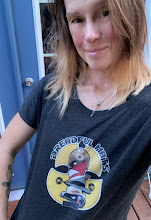The last sentence of Part II is “What a lark.” The first of Part III is “Now that I am out of the hospital, I have to sit and write again.” The change in mood is clear.
We don’t yet learn what exactly happened on that frivolous, ill-fated boat ride.
Neila is now the Minister of Information because Wils is dead, we assume in the unexplained boating accident. She has a high-profile, decadent office; it is a corner office with six windows and carpeting and a sofa. (Side note: my mother writes “sofa,” but I thought my use of “couch” was from her. Maybe this was an editor’s hand; I am reading the U.S. edition.) We know where Neila stands, still seeing herself as a resistor, though she plays along without actually supporting the Complex agenda.
In Part II, before the boat ride, Wils warned Neila about writing too much: “’You’re too involved with writing things down. Don’t do it. I’m trying to warn you.’” Was he threatening her or helping her? Was he a loyal Complexer? A resistor? Neila assumed he was threatening her – despite the fact that they had become lovers.
When Neila finally reveals what happened on the boat ride, we are told that neither the boat nor the bodies were found. Did the others all drown? Perhaps it is predictable that someone could have survived. The possibility that Neila will be revealed as a resistor is wide open.
Questions answered:
In this part of the novel, the reality of the Island, to where resistors are exiled, is revealed. What and where is the Island? Who is there? Is it a prison setting? The 10,000 resistors there are in exile with nothing to support them on the previously uninhabited and inhospitable Island where it rains for most of the year. But what Neila finds on her visit to the Island deepens the mystery of Lak, her beloved who disappeared after Part I. He is not there with his family. But his coded letters from Part II of the novel mention sea air. Did he escape capture? Where is he?
In addition, Neila meets an old man who knew her parents, who died in a car crash when she was a baby. She learns unexpected information about them. They were resistors, but they really did die in a car crash; they were not murdered as she suspected. And her mother had an affair with an unnamed Complex official.
Taking action:
Neila is ineffective and misunderstood throughout this part of the novel. Though she has authority in the totalitarian regime, she can’t change it and can’t do anything overt about the injustice of the Island. Her foster family even believes she turned them in as resistors. She defends herself, but no one trusts her, not the resistors, not the Complexers
Not words, not writing, but action is Neila’s turning point.
Neila decides to take 300 exiles, the most that will fit on the ferry, back with her and let them escape, swim through the shallows, before the ferry docks. She gives the ferry to a handful of resistors who remain aboard in order to help the remaining Islanders escape.
But her action is ineffective and awkward. They exiles don’t trust her, and we don’t know if they follow through on the full plan. Neila observes, “I was forcing this rescue on these miserable wretches and risking everything.” Barm, the resistor and writer Neila interviewed in Part II, is now on the Island. Neila appeals to him: “’They won’t let me rescue them.” He replies, “Why should they give you that glory?”
Everything changes for Neila after the Island trip, but not because she has helped the resistors. This action seems to go unnoticed, as least for now. It is not this boat ride to the Island that brings change, but the frivolous one from Part II.
More about writing:
I believe my mother includes her own writing process in the narrative. The chapter begins: “It is difficult to start again. I have forgotten the mood, the reasons I am doing this. But if I do it scene by scene, episode by episode, one step at a time, everything will come together.” It is as if she retained what she wrote to keep herself writing the novel as part of Neila’s story.
And, on the Island, Neila and Barm again discuss writing. Neila tells him, “Someone has to write it down,” meaning the truth of the Island. Barm replies, “Then you write it down. You go home and sit down and write it all down. As for me, I’ve grown beyond paper and pens.” In this exchange, there is ambivalence about writing, a questioning about writing.
And, like a writer, Neila admits the possibility of conflicting versions of stories: "I am always interested in versions of the truth," as my mother was.

No comments:
Post a Comment